The Future of Food is Indigenous
Cultural Celebration vs Cultural Appropriation: Yup'ik vs Yupik
“What people have forgotten is what every salmon knows. Salmon understand the art of facing things.”
I'm Charity Qalutaq Blanchett. I’m an Indigenous Yup’ik and Black woman born in Alaska on Dena’ina Land, a descendant of the Yup’ik tundra, from Tuntutuliak, the land of the caribou with an ancestral bloodline traced back 10,000 years, ultimately time immemorial. My mothers village sits on Qinaq River, where marshy tundra weaves its way three miles and meets the current of the Kuskokwim River, eventually opening to the Bering Sea. My mothers rural Alaska Native village is home. My Yup’ik name is Qalutaq, its means Dipping Spoon. A name passed down to me, my ancestral blueprint. The meaning of Dipping Spoon, “From one dip you serve other people, dip into water and the water is given to everybody, it grows and keeps going.”
In 2019 from the balcony of my lower garden district home in New Orleans, I founded the Dipping Spoon Foundation. Our mission is identifying and cultivating the next generation of Black, Indigenous, Women of Color and Youth to become culinary rockstars by providing aspiring chefs between 18-26 years old with a full ride culinary and pastry arts scholarship and shifting culture by creating access to inclusive and dynamic FoodSTEM programs rooted in Cultural Identity, Food Sovereignty, Food Science and Food Math for Girls and Boys through 7th-12th grade.
We do this by offering monumental access to all the avenues which food touches, Science, Technology, Engineering, Arts, Math and for dessert, Public Policy, sprinkled with Equity. Not everyone is going to be a head chef at a restaurant or a celebrity chef on television. There are endless educational, employment and executive level business opportunities through food.
Fall/Spring 2021-2022 Dipping Spoon partnered with the Lower Kuskokwim School District (LKSD) for our inaugural FoodSTEM curriculum and after school club, #SelfFSTEAM for 7th-11th grade Indigenous Youth which celebrates culture, nature, identity, traditional values and the earth through Food and Steam: Food, Science, Technology, Engineering, Arts, Math and for dessert Public Policy.
LKSD is Alaska’s largest rural school district in the number of schools, students, and staff. It is located approximately 400 air miles west of Anchorage, the district encompasses the lower part of the Kuskokwim River Delta, along the coast of the Bering Sea. It is Alaska’s second largest rural school district in terms of geographical area with roughly 22,000 square miles of roadless tundra, and area equivalent in size to the state of West Virginia. Headquartered on the main campus in Bethel, the district office provides coordination of services and support to 22 village and 6 Bethel schools. Our culinary after school club piloted at three rural school sites including my mothers village Tuntutuliak, Goodnews Bay and Kipnuk with the intent to grow District wide.
We utilized Chef Alice Water’s inclusive and dynamic Edible School Yard curriculum. Alaska’s unique geography & cultural diversity are what makes us standout out nationwide. Technology, media and innovation are at the forefront of our programming. Together Dipping Spoon and the Lower Kuskokwim School District are shifting culture and creating a paradigm shift of change for aspiring Indigenous chefs and food lovers to have educational and entrepreneurial access to every single industry food touches.
Late spring of 2022 Dipping Spoon held our first weeklong Culinary Arts Camp Intensive in rural Alaska at Bethel Regional High School for ten Indigenous students from the Lower Kuskokwim School District. The culinary camp was a week-long intensive teaching the fundamentals of cooking as they dove into the four elements that make food taste great. Dipping Spoon student programming was rooted in FoodSTEM, Cultural Identity, Food Sovereignty and traditional values merged with modern day techniques. We utilized The Edible Schoolyard’s curriculum which introduced basic knife, cooking and cleaning skills with the curriculum slightly tweaked based on the needs of Bethel’s rural location. This included creating our own harvest map and seasonal hunting guide.
Camp leaders and students loosely followed Chef Samin Nosrat’s cookbook and Netflix show and format: Salt, Fat, Acid, Heat and Alison Roman’s Home Movie pantry receipes. Each day was themed around all episodes with continuing discussions around tastes and flavors while we cooked and communed together. And did we cook together!
#SelfFSTEAM campers took field trips to the grocery store and visited the only farm in Bethel, Alaska, Meyer Farm. Our students journaled about their cooking experiences at home and camp, blind tasted food and noted what excited or didn’t them about a new taste and flavor, they produced their own food photography, food writing, menu development and working together as a team. They learned when we respect our ingredients in the kitchen and workstation, we in turn are respecting the land, ocean and sky. Which leads to our identity and culture.
After a week long intensive, cooking two meals a day our campers took on the ambitious task of catering Bethel Regional High School’s Student Art Showcase where they debuted their culinary art and menu. Chef are artists, food is their paint. Chef’s are also scientists, chemists’, mathematicians, poets and businesspeople. Our students embarked on a massive feat and delivered big time on taste, presentation, flavor and creativity. Like Salmon, Dipping Spoon students understood the art of facing things, trying new things and not being afraid to journey to a destination unknown.
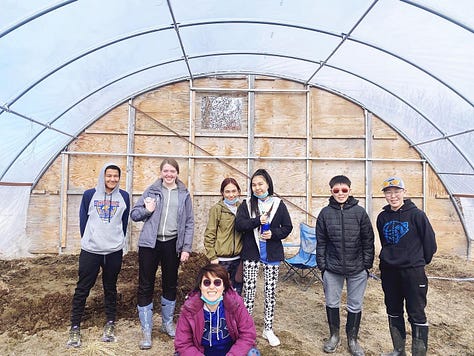
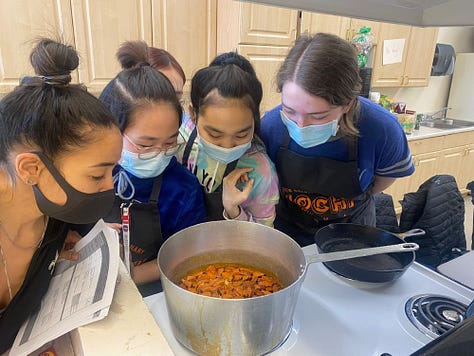
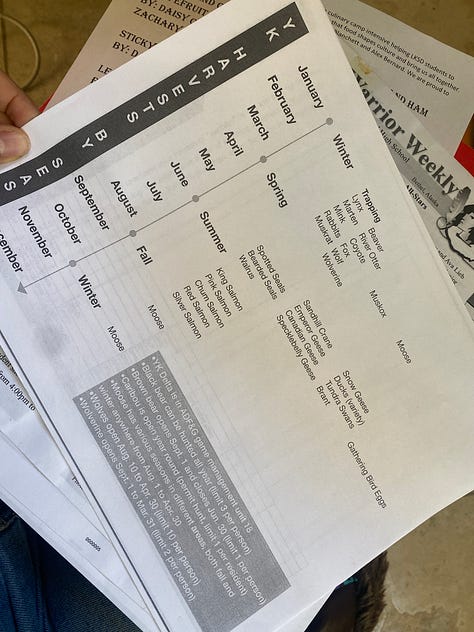
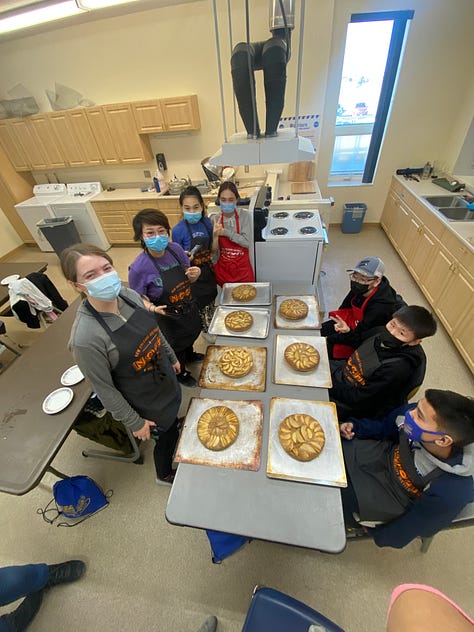
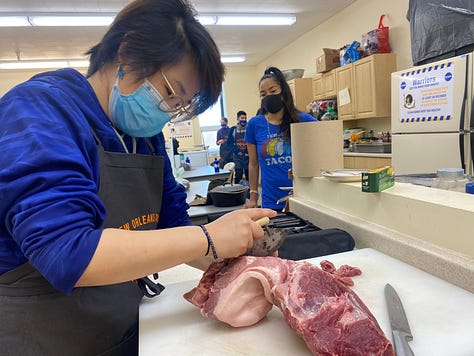
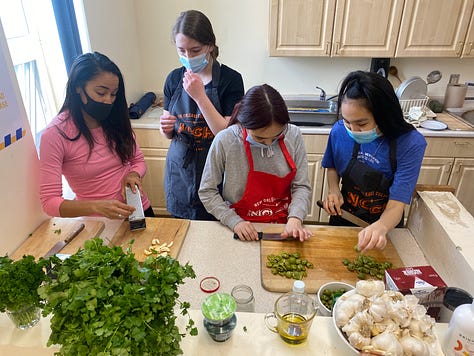
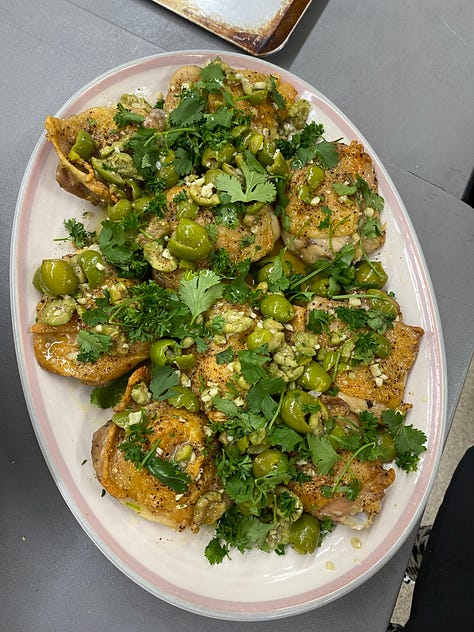
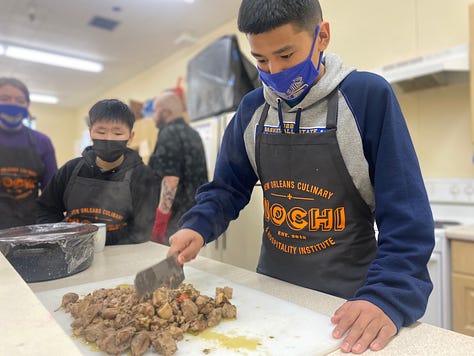
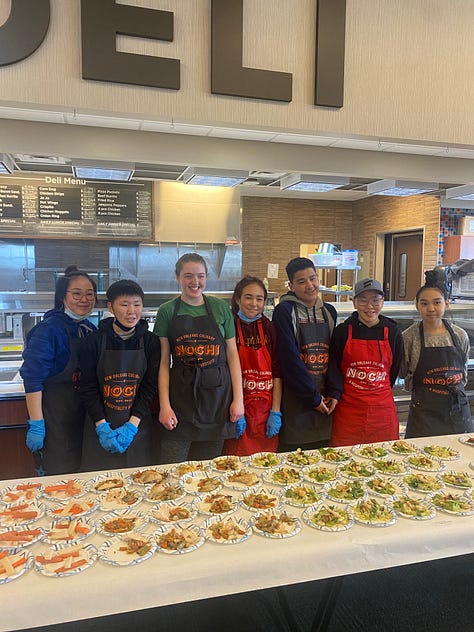
A spring year later I received an email from rural educator, Alex Bernard in Bethel, Alaska reading:
“The reason I am emailing you is to see if the scholarship program for the culinary arts in New Orleans is in place. I have a young woman Yup’ik lady who is super passionate about pastries and the culinary arts. Your program came to mind first.”
Dipping Spoon’s mission had come full circle. We had a first possible applicant, a young Yup’ik woman. An Indigenous student. This has been my dream formed from a mustard seed, turned into a goal and now has the opportunity to be majorly transformed into reality. An exciting life changing moment for an Indigenous student.
Around the same a time, an educator from rural Bering Straits School District contacted me with the hopes of partnering for Fall 2023 school semester SelfFSTEAM after school programming. Bering Strait School District is a school district in northwestern Alaska, United States, serving approximately 1,700 students in grades K-12 in fifteen isolated villages. All schools in the district serve students of all ages, and most classrooms are multi-age. The district headquarters are in Unalakleet, Alaska.
What a personal accomplishment! Especially after completing a nine month Legacy Network fellowship with the James Beard Foundation and being selected as U.S. Speaker with the U.S. State Department where I was panelist during Native American Heritage Month highlighting my work as an Indigenous leader providing perspectives on key issues such as access to education, environmental stewardship, economic opportunity and mentoring the next generation of Indigenous leaders.
It was the highest accolade of my life, an incredible honor to be recognized for my work and unwavering mission with Dipping Spoon. An Indigenous and Black U.S. Speaker selected by the U.S. Speaker Program by the State Department. Remembering a journal entry from years before, I want to become a Motivational Speaker for Indigenous Women and Youth.
After my chats though, I hit a wall. After the emails from Alaska stating rural areas wanted more, I recognized the shell shocked news that shook my personal values and business values. My North Star is fueled by access, representation and cultural identity. I envision a global world where all Indigenous youth champion their culture, ancestral blueprint to rebel against institutional boundaries to become creative entrepreneurial culinary rockstars through food, science, media, design and public policy.
This is why I, A Yup’ik woman and Black woman born in Alaska, a descendant of the Yup’ik tundra, from Tuntutuliak, the land of the caribou with an ancestral bloodline traced back 10,000 years, since time immemorial, I cannot and will not let, any company or entity steal and profit off of my ancestral Yup’ik identity.
A year ago I discovered a Canadian consumer packaged goods company egregiously named Yupik. Their mission,
“At Yupik, our goal is to combine years of experience in direct sourcing and manufacturing of high-quality products to provide you with ingredients & snacks that cater to your tastes. We carry an extensive organic and conventional variety of products, such as nuts, dried fruits, superfoods, snacks, mixes, candies, chocolate & cooking products. Our tenacity and ambition continues to make us grow and work harder every single day to offer quality ingredients and snacks that speak for themselves.”
This Canadian food based corporate company stole the name of my people, bought the domain name yupik.com, registered and trademarked Yupik with the intent to sell to their Canadian and global non-Canadian market. A large scale Canadian consumer package goods company owns Yupik. We are a Federally Recognized Tribe. A name rightfully owned by Yup’ik people, our bloodline. A name which means, The Real People. This is erasure of culture and deeply violent.
Canada has a terrible history of racism and violence towards Indigenous children and people, and for them to cross the line so boldly and appropriate Indigenous Yupik people, dismissing us as if our history does not exists, our existence does not matter. How did this happen? Who did their due diligence? A corporate consumer packaged goods company in food no less? Blatant eraser of culture, overtly and distastefully gross. Do they have any Indigenous people working for their company? I advocate representation in all the avenues food touches, my work is anchored in it. This company does not advocate nor do they care, because if they did, they never would have so grossly named their nut-picking company, Yupik. Who is on their Executive team? No one in marketing spoke up? Surely they have a board member who might've been curious on branding and public relations. What government entity and/or attorney gave them authority to cross country lines and purchase a name, people and culture which does not belong to them. Purpose is more than a marketing dollar, it’s not about what you say its about what you do. This company is actively participating in racism, erasure of culture, colonial power and maybe a mammoth landmark case.
On July 19th, 2022 I tagged Yupik in my stories stating my Indigenous Yup’ik ancestry and how blatantly wrong their company name is and they should be ashamed. I shared a Black and White photograph of my mother as toddler in Tuntutuliak, Alaska with my Aunties and Grandmother wearing our traditional fur atkuk’s and kameksiik’s, or what western culture calls parka and mukluks. A photograph depicting the Real People.
This Canadian company responded to my tagged stories with this:
“Hello Charity, Thank you for reaching out. We take your input at heart and hope to answer some of your concerns. Our brand name is based on an abbreviation of the English words, “You Pick”, because we offer a large selection of food products that one can pick from. We mean no offense to the Yup’ik people. We value and actively promote respect, inclusion, and diversity within and outside our organizations. People of all horizons and backgrounds work at Yupik and we are grateful that they are a part of our family. Once more, we appreciate your time and remain available at support@yupik.com if you wish to share further, concerns, or suggestions, Respectfully.”
Respectfully, their response is full of coded language and furthermore showcases their grave disconnect with culture. Indigenous Yup’ik values are based in sharing, community and love. This company does not embody any form of value system, in fact, they are promoting deep seated racism, ugly cultural disrespect, exclusion and lack of diversity and common sense to understand their actions are sickening. There response is basically what fragile white people in America say all of the time with their unconscious, “Well I have Black friends.”
The Future of Food is Indigenous. The Future of Food is fueled by cultural representation. The Future of Food is not allowing foreign corporate organizations to commit what I consider a crime by stealing the name of my people, a United States Federally Recognized Indigenous Tribe from the Yukon Kuskokwim Delta for greed, control and power.
What is my ask? This Canadian must change the name of their company and rebrand immediately, internally and externally. It is going to be costly. It will not be cheap. They must sign a pledge to invest in programming for the next Generation of Culinary Rockstars through all the avenues that food touches. They will assist Dipping Spoon’s growth in Canada to all Indigenous nations. They must complete an internal audit and hire Indigenous people. They must admit, the people who signed off, must state their names, admit the wrongdoings and explain their plan of action to do better and how they will implement it.
Dipping Spoon’s mission has come full circle. We have a first possible applicant, a young Yup’ik woman. An Indigenous student. An exciting life changing moment. I can’t wait to see what she becomes and how she designs her life through food! If we have one student, it means we have a community of students. Which is is why Dipping Spoon’s programming needs to continue in Indigenous rural Alaskan school districts AND BEYOND.
It also means as a leader, Founder, CEO and sole decision maker I must adapt to change, discomfort and eye opening truths about the Food Industry. How can I advocate for cultural and gender representation in the all avenues that food touches and inspire Indigenous youth when there is a CPG company basically telling my students they don't matter, their cultural identity doesn't matter? And not just telling us, they're showing us. This is a pattern!
I am asking you, my readers, Substacl community and beyond to join me and support in our mammoth task to save the Future of Food for Indigenous Youth.
This Canadian company must change their name.
I will never give up on access or questioning why systems operate the way they do. Dipping Spoon’s after school culinary club students and our future scholarship recipients deserve their time to innovate, shine and thrive. To create and be an active participants in the culinary business world and the world they want to live in and chose to live. To see themselves, their cultural identity in all the avenues food touches Science, Technology, Engineering Arts, Math, and for dessert Public Policy.
Together we are creating a paradigm shift of change. This is is our strength and super power. I believe we champion culture by rebelling against boundaries.
We’re investing in the next generation of Indigenous culinary rockstars chefs, ceos, c -suite executives, artists and political leaders.
This is the Future of Food.
Quyana,
Charity Qalutaq Blanchett
Founder & CEO, Dipping Spoon Foundation
U.S. Speaker & Activist


